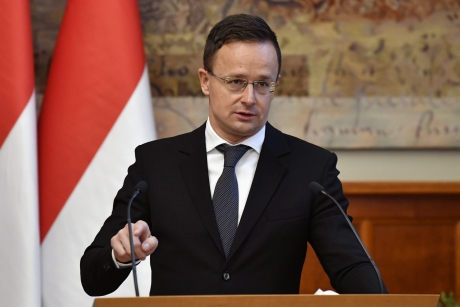Romania should have already been part of the Schengen Area, a context in which the economic relations between Hungary and Romania, including those in the cross-border areas, would have more to gain, the Minister of Trade and Foreign Affairs of the Hungarian Government, Szíjjártó Peter said on Tuesday in Oradea.
“I don’t think we can talk about illegal migration or the pressure of illegal migration when it comes to Romania and I don’t think this is a reason for Romania not to enter the Schengen Area. The economy of Romania, Hungary and the cross-border areas would benefit from following Romania’s entry into the Schengen Area. That is why I would like to request that the European Commission reopen Romania’s file for accession to the Schengen Area as soon as possible. We hope that the two countries that have expressed their right to veto will change their position. And we hope that we can take advantage of the bilateral relations and this cooperation as much as possible. We will support Romania with all efforts to join the Schengen Area”, Minister Szíjjártó Peter said in his speech.
According to Szijjarto, the cooperation between Romania and Hungary is strategic, the Interreg programs, implemented in seven-year cycles, have an important role in this field.
“The cooperation between the two nations allows them to be better connected, to have closer relations and to live better together, in the neighborhood. The border is a uniting element, which creates a cultural and economic link between the two nations. This program will gives a new impetus to the economic cooperation between our countries, being a success story. But the event that will crown these successes will be Romania’s entry into the Schengen Area,” said the Hungarian minister.
The Interereg VI A Romania – Hungary (cross-border cooperation) program for the period 2021 – 2027 is the third cooperation program after Romania’s accession to the EU and has a total budget of 176 million euros, of which 140 million euros is European funds, the rest – contributions of the two states.
The Ro-Hu program is coordinated by the Management Authority within the Ministry of Development, Public Works and Administration, and the Oradea Regional Office for Cross-Border Cooperation (BRECO), director Livia Banu, is the institution that houses the Joint Secretariat and the First Level Control of these programs.
The launch event was attended by representatives from the Government of Romania, the Government of Hungary and the European Commission, the ambassador of Romania in Hungary and the ambassador of Hungary in Bucharest, presidents of the County Councils from the eight cross-border counties (four Romanian, four Hungarian), official authorities. On behalf of the Ministry of Development, Minister Cseke Attila was present, who declared that, after the event in Oradea, he would participate next week, in Iasi, in the launch of the new Interereg Program Romania – Republic of Moldova.
“Today, May 9, 2023, on Europe Day, I can say that the Romania-Hungary cross-border cooperation program, in addition to solving specific problems of the communities, through the strategic character and nature of these projects, creates and strengthens links between the communities in the cross-border area. Links which, without a doubt, increase the value of these investments,” said Minister Cseke.
The director for European territorial cooperation, representative of the European Commission, Slawomir Tokarski mentioned, in his speech, that European borders, instead of being dividing lines, must be meeting points to achieve common objectives, so that the 30% of European residents living in border areas should benefit from the best possible conditions.
“The most important element is the strengthening of trust in the cross-border area. Trust is the basis of cooperation, solidarity and the cornerstone of the European project, even more so today, when we live in times of divergence. Let’s turn borders into bridges of connection,” said the EC representative.

